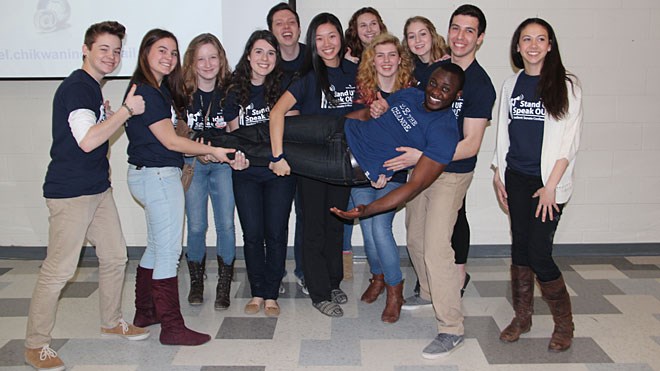“As I looked around the field, there were hundreds and hundreds of skeletons, some of them with no skulls,” said Chikwanine, speaking in Sudbury April 23.
“I was so terrified of what I was watching. I ran over to one of the rebel commanders. I kept begging him to let me go home. But every time I'd say something, he just kept on laughing at me.”
The rebels told the children they were being initiated into their army, and Chikwanine was blindfolded and handed an assault rifle. He wasn't strong enough to hold it, and dropped it on the ground.
A soldier held up the gun, put Chikwanine's finger on the trigger, and told him to shoot, and he did. When the blindfold was removed, he saw he'd killed his 12-year-old friend, Kevin.
Things progressed this way for two weeks, until the kids were told the rebels would be raiding a village.
When the raid started, Chikwanine waited until he was sure nobody was paying attention to him, and escaped into the bush. He ran through the jungle for three days until he happened to stumble upon his own community of Beni.
The little boy passed out while trying to explain to the town's storekeeper what had happened to him, later waking up in hospital, surrounded by his family.
“My dad came running through the doors, grabbed me, hugged me so tightly, and kept asking me where I've been,” Chikwanine said.
“I couldn't explain to him. He grabbed both of my hands. He said 'Michel, I promise you this will never happen to you ever again. I promise you that.'”
Chikwanine, now a 26-year-old University of Toronto student, shared some of his experiences at the Stand Up! Speak Out! Conference, which was attended by about 100 local high school students April 22-23.
It was organized by the Rainbow District School Board's student senate, and was designed to nurture their leadership skills.
While Chikwanine managed to escape from his captors, unfortunately, it wasn't the only bad thing that happened to his family.
He said his family was targeted because his father was a lawyer and human rights activist, and often wrote articles about the war in Congo. His mother and older sisters were raped by rebel soldiers, and his father poisoned, dying in 2001.
In 2004, Chikwanine immigrated to Canada. He was 16 years old.
Because he couldn't believe how much his peers at his Ottawa high school complained about their affluent lives, he wrote out his life story and passed it around. That just earned him the nicknames “Africa” and “Blackie.”
But Chikwanine was determined to make a difference. He began speaking to groups about his experiences through Free the Children, an international charity founded in 1995 by 12-year-old Canadian Craig Kielburger.
“I talk about the war in Congo ... to raise awareness about it,” he said.
Chikwanine, who aspires to become a professor of African studies, said he hopes the students listening to his speech are inspired to make a difference in their own way.
“I hope what they got from my story is that courage is something everybody can have,” he said.
Student trustee and Lockerby student Roberto Bagnato, who helped to organize the conference, said he was inspired by Chikwanine's story.
“I couldn't imagine the things he's been through,” he said, adding that it's phenomenal that he's giving a voice to the people of Congo.
“He's completely dedicated his whole life to doing that.”
